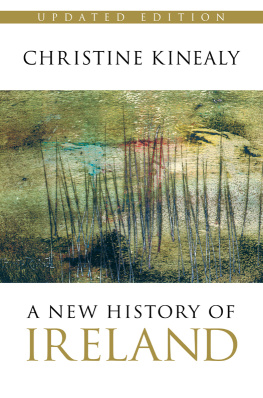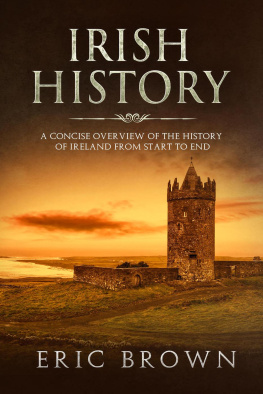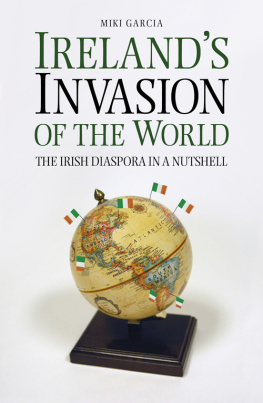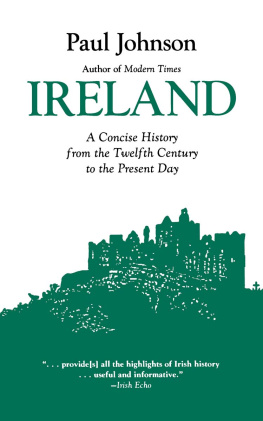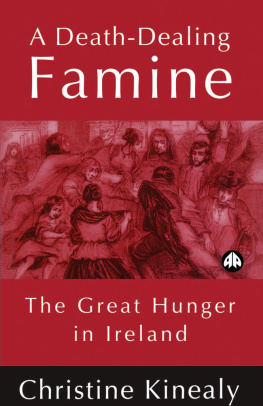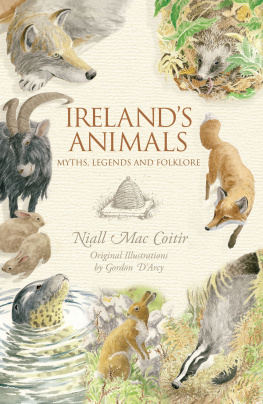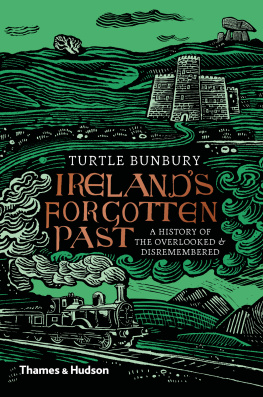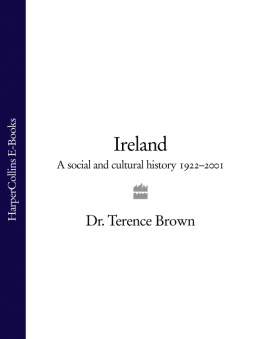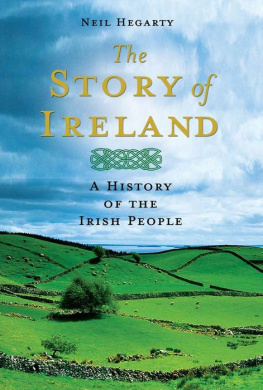Kinealy - A New History of Ireland
Here you can read online Kinealy - A New History of Ireland full text of the book (entire story) in english for free. Download pdf and epub, get meaning, cover and reviews about this ebook. City: Stroud, year: 2013, publisher: The History Press, genre: Religion. Description of the work, (preface) as well as reviews are available. Best literature library LitArk.com created for fans of good reading and offers a wide selection of genres:
Romance novel
Science fiction
Adventure
Detective
Science
History
Home and family
Prose
Art
Politics
Computer
Non-fiction
Religion
Business
Children
Humor
Choose a favorite category and find really read worthwhile books. Enjoy immersion in the world of imagination, feel the emotions of the characters or learn something new for yourself, make an fascinating discovery.
A New History of Ireland: summary, description and annotation
We offer to read an annotation, description, summary or preface (depends on what the author of the book "A New History of Ireland" wrote himself). If you haven't found the necessary information about the book — write in the comments, we will try to find it.
A New History of Ireland — read online for free the complete book (whole text) full work
Below is the text of the book, divided by pages. System saving the place of the last page read, allows you to conveniently read the book "A New History of Ireland" online for free, without having to search again every time where you left off. Put a bookmark, and you can go to the page where you finished reading at any time.
Font size:
Interval:
Bookmark:
A NEW HISTORY OF
IRELAND
ABOUT THE AUTHOR
Christine Kinealy is one of the leading younger Irish historians. Currently Professor of History at the University of Central Lancashire, she has a PhD from Trinity College, Dublin. She has lectured extensively in North America and in 1997 was invited to lecture on the Irish famine before a select commitee in the American House of Representatives and, in the same year, in the House of Commons. Her previous books include A Disunited Kingdom and the award-winning The Great Calamity: The Irish Famine
A NEW HISTORY OF
IRELAND
CHRISTINE KINEALY

First published in 2004
Published in this edition in 2008
The History Press
The Mill, Brimscombe Port
Stroud, Gloucestershire, GL5 2QG
www.thehistorypress.co.uk
This ebook edition first published in 2013
All rights reserved
Christine Kinealy, 2004, 2008, 2013
The right of Christine Kinealy to be identified as the Author of this work has been asserted in accordance with the Copyrights, Designs and Patents Act 1988.
This ebook is copyright material and must not be copied, reproduced, transferred, distributed, leased, licensed or publicly performed or used in any way except as specifically permitted in writing by the publishers, as allowed under the terms and conditions under which it was purchased or as strictly permitted by applicable copyright law. Any unauthorised distribution or use of this text may be a direct infringement of the authors and publishers rights, and those responsible may be liable in law accordingly.
EPUB ISBN 978 0 7524 9625 2
Original typesetting by The History Press
C ONTENTS
A CKNOWLEDGEMENTS
T he writing of this book has benefited from the work of many scholars working in the field of Irish history. I am also indebted to the following people who have read and commented on various sections of the book. They are Sen Egan, Peter Berresford Ellis, Robert Langford, Honora Ormesher, Francine Sagar, David Sexton and, last but not least, John Walton. The probing questions of colleagues, students and friends have also helped to focus my thoughts, and I would like to thank Scott Brewster, Ivan Cooper, Debra Ferris, George Harrison, Reesa Jenkins, John Joughin, Joie Karnes, Michael Parker, Carol Russell, Marcelline Jenny, William Rogers and Jack Worrall. Finally, I would like to thank my children, Siobhn and Ciarn, for their encouragement and laughter, and to them this book is dedicated.
I NTRODUCTION
I rish history, to a large extent, has been influenced by waves of conquest and settlement from the Celts in the sixth century BC to Eastern European refugees at the beginning of the twenty-first century. Ironically, perhaps, the greatest icon of Irishness, St Patrick, was born in Britain in the fifth century and he demonstrated the close linkages between Britain and Ireland even at this stage. One of the themes of this book is that Irish history cannot be understood without reference to British history, just as British history is diminished without reference to developments in Ireland.
Significantly, different epochs or movements in Irish history have been characterised by the wave of settlers that shaped them: the early Christian period, the Viking and pre-Viking periods, the Norman, the Old English, the New English, the plantation of Ulster, the Protestant ascendancy and the Anglo-Irish period. All had roots in Irelands relationship with England in its various manifestations, as part of the Angevin Empire, Britain, the United Kingdom, the British Empire and the Commonwealth. At the same time, each phase was firmly grounded in the Irish experience and Irelands capacity to absorb, assimilate and enrich other cultures and ideologies. Irish identity, in turn, was shaped and enhanced both by its opposition to, and its acceptance of, each of these influences.
Ireland is a small island situated on the periphery of Europe, lying on the margins of the continental land mass, yet despite its size and isolation, it played a central role in shaping the progress of its European neighbours, from the time of the early Christians through to the European Union. In turn, the history of Ireland has also been shaped by wider European developments, notably the spread of Christianity, the Norman expansion, the Reformation, and the growth of ideologies such as liberalism, nationalism, republicanism, socialism and feminism. Each of these advances has brought Ireland closer to Europe, while Europe has been enriched by Irelands contribution to its development. Since the eighteenth century also, other parts of the world, most obviously North America, have impacted on developments in Ireland, and vice versa.
The peripatetic Irish monks in the sixth to ninth centuries took their scholarship to all parts of Europe, possibly even getting as far as North America. The spirit of adventure remained powerful, as people left Ireland to be settlers, explorers, soldiers and mercenaries. Other groups of emigrants went in less happy circumstances, as political refugees or economic emigrants the impact of the Great Famine, in particular, provided a powerful image of emigration as enforced exile. The movement of Irish people did not just change the new societies in which they settled, but also impacted on the country they had left. Irish nationalism (itself an amalgam of American, French and Italian political movements) was to become a model for other colonised peoples. Paradoxically, being part of the British Empire provided increased opportunities for Irish people in the nineteenth century as imperial administrators, military enforcers, or simply settlers. For some nationalists, an unresolved paradox was how could Ireland be both colonial and imperial concurrently?
From the fifth century also, Irish history was dominated by the attempts of the Christian Churches to influence events in Ireland framed by the emergence of Patrician Christianity in the fifth century followed by attempts to impose the authority of Rome, the Reformation in the sixteenth century and the constraints associated with the penal legislation, all of which was followed by regroupment and a reassertion of church dominion in the nineteenth century. At the end of the twentieth century, secularisation and the implosion of the Catholic Church as a result of numerous scandals proved to be more challenging to the Churchs authority than the subjugation of earlier centuries by a Protestant state. The impact of the Protestant Churches on Ireland was also powerful. From the sixteenth century the Anglican Church was the state church despite being the religion of a minority. Its wealth and political influence made up for its lack of numbers. Its supremacy was challenged in the nineteenth century and increased as the Protestant minority in Ireland formed a united front to resist the new challenge of a nationalist movement that identified strongly with Catholicism. This political alignment along religious lines was not inevitable. Supporters of non-sectarian politics were present in all churches. Irish Protestants in the late eighteenth century proved their patriotic and republican credentials in the struggle for Irish independence. The 1798 Uprising and the Young Ireland movement in 1848 were led by Protestants, many from Ulster, who consistently argued than the Protestant ascendancy should not be replaced with a Catholic ascendancy. At the beginning of the twentieth century, some members of the Orange Order argued for a fresh accommodation with nationalists under the common banner of being Irish, while many of the leaders of the 1960s civil rights movement were Protestant. This book also seeks to give a voice to the diversity of the Protestant contribution to Irelands development.
Next pageFont size:
Interval:
Bookmark:
Similar books «A New History of Ireland»
Look at similar books to A New History of Ireland. We have selected literature similar in name and meaning in the hope of providing readers with more options to find new, interesting, not yet read works.
Discussion, reviews of the book A New History of Ireland and just readers' own opinions. Leave your comments, write what you think about the work, its meaning or the main characters. Specify what exactly you liked and what you didn't like, and why you think so.

